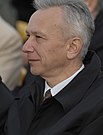2000 Ostric regional election
| |||||||||||||||||||||||||||||||||||||||||||||||||||||||||||||||||||||||||||||||||||||
All 15 seats in the Dorada 8 seats needed for a majority | |||||||||||||||||||||||||||||||||||||||||||||||||||||||||||||||||||||||||||||||||||||
|---|---|---|---|---|---|---|---|---|---|---|---|---|---|---|---|---|---|---|---|---|---|---|---|---|---|---|---|---|---|---|---|---|---|---|---|---|---|---|---|---|---|---|---|---|---|---|---|---|---|---|---|---|---|---|---|---|---|---|---|---|---|---|---|---|---|---|---|---|---|---|---|---|---|---|---|---|---|---|---|---|---|---|---|---|---|
| |||||||||||||||||||||||||||||||||||||||||||||||||||||||||||||||||||||||||||||||||||||
| |||||||||||||||||||||||||||||||||||||||||||||||||||||||||||||||||||||||||||||||||||||
The 5th Ostric regional election occurred on 19 March 2000. The governing Social Democratic Radical Party of Jón Burgstaller not only retained its lead, but increased its vote substantially, the first time a senior Ostric governing party increased its vote share. After the election, a centrist grand coalition between the SRPO and the Ostric Liberal Party was formed.
Background
The 1996 snap election saw the formation of a left-wing grand coalition between the unionist Social Democratic Radical Party and the separatist Ostric People's Party, in both the first "cross-sectarian" government and first grand coalition.
The government presiding over a vast expansion of the Ostric welfare system and a time of economic growth after the recession of the early 1990s. However, many supporters of the People's Party felt betrayal over agreeing to joining in government without negotiating a referendum on independence, seeing the party consistently drop in polls in favour of the newly established Ostric Coalition, founded by fishing magnate Léch Kneller.
Electoral system
The electorate elects all fifteen members of the Dorada using single non-transferable vote in one island-wide multi-member constituency.
Results
| Party | Votes | % | Seats | +/– | |
|---|---|---|---|---|---|
| Social Democratic Radical Party | 5,287 | 39.47 | 7 | +2 | |
| Ostric Liberal Party | 2,774 | 20.71 | 3 | 0 | |
| Ostric People's Party | 2,464 | 18.39 | 3 | –1 | |
| National Consolidation Party | 1,202 | 8.97 | 1 | 0 | |
| Ostric Coalition | 1,094 | 8.17 | 1 | New | |
| Ostric Party | 575 | 4.29 | 0 | –2 | |
| Total | 13,396 | 100 | 15 | 0 | |
| Registered voters/turnout | 16,528 | 81.05 | – | – | |
Reactions
The SRPO dominated the election, polling the highest in its history at that point. Minister-Chairman Burgstaller announced after the results released that he was open to various negotiations from both the People's Party and the Liberal Party. With dropping to third place and facing a new challenger in the separatist camp, People's Party leader Waléry Plank announced his resignation on election night, and the party stated it would go in opposition. After this, a agreement was signed between the SRPO and the Liberal Party to form government together, eased by the turn of the OLP and its leader Arne Gotti to the left during the campaign.
Weranic media focused heavily on the populist Ostric Coalition and its entry into the Dorada, passing in votes the more established Ostric Party in the process, who failed to re-enter the legislature. Papers often considered the Coalition a rival against the People's Party for nationalist votes, and a possibly thorn in the side of the new government.




